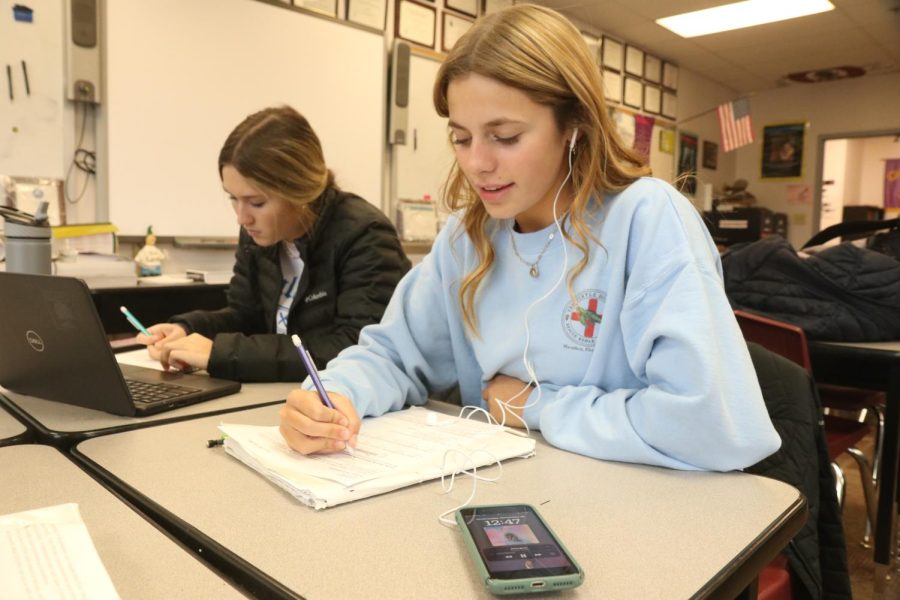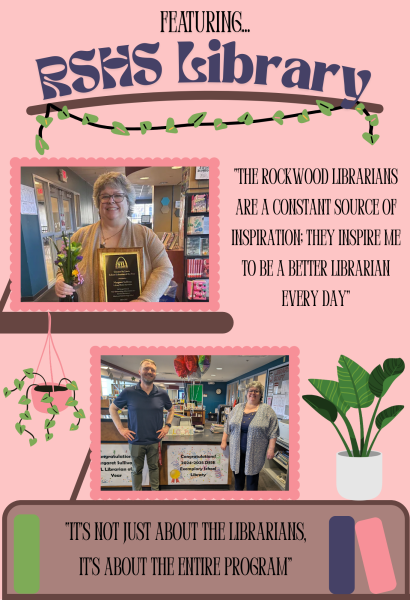Music as a study aid varies among classrooms
As she listens to music in AC-Lab, junior Ali Sandler works on her AP statistics homework while senior Maria Scotti completes her AP economics homework without any music. Students are debating whether or not listening to music is best for the completion of homework.
Many teachers choose to play music in their classrooms during work-time, and many students enjoy listening to music while they complete their work, but how does this affect students’ learning?
Science teacher James Rinehart said he approves of playing music in his classes, but he has sympathy for students that might not feel that same way he does about his classroom tunes.
“I like it, but I prefer my music to be instrumental and not distracting. I wouldn’t want it if I was trying to read a book, for example. That would be distracting to me. But for something like group work it would be fine. That’s the only objection I think I might have as a student. Also, if students aren’t feeling it that day, I offer to turn it off or I’ll take song suggestions to keep everyone involved,” Rinehart said.
Outside of school, Rinehart said he takes a similar approach to his own working environment.
“The same rules go for me if I’m at home working. I’ll put on something kind of light and instrumental to help me focus, so if it helps me then I assume it will help others,” Rinehart said.
Another teacher fond of playing music in his classes is Science teacher Michael Cunniff, who always plays 70s and 80s music.
“I’m a fan of playing music but it has to be the right type of music. Like 70s-80s catchy stuff, I grew up with 80s music and some late-70s too so that’s the type of music I enjoy. Especially music from movie soundtracks like The Breakfast Club, for nostalgia,” Cunniff said.
But Cunniff said he doesn’t just use music as a fun addition to teaching AP physics or chemistry, he said it’s also a way to manage the class.
“It seems like when the music starts they know it’s individual work time. Some kids put in their own music and that doesn’t bother me. I’ve noticed that it’s a cue to get to work and if I don’t play music some kids will ask me to put it back on,” Cunniff said.
Sophomore Logan Schober said that certain types of music can have different effects on your brain while studying.
“I was in ALARP 1 last year and my topic was how music affects the human brain. I found that when you’re studying you should listen to music that’s close to 60 BPM and electronic beats,” Schober said.
Schober said he uses a unique method while studying that taps into the brain’s memory and senses.
“There’s a method that I use when I’m trying to memorize something called the gum chewing method. The idea is that when you’re trying to remember something, you chew gum while you’re memorizing the information and when you chew the same gum during the test, you’re able to recall that information. It’s the same idea with music, if you listen to the same melody over and over while you’re studying it can help you during a test if you hum that song to remember the information,” Schober said.
But overall, Schober said it’s up to the person who’s studying to make the best choice for themselves.
“It really all just depends on what kind of person you are, if you usually like music then you’re going to like music when you’re studying. Otherwise, It’s probably not going to work for you,” Schober said.
Language arts teacher Elizabeth Kelley-Hirata said she takes a more individual approach to playing music in class, thinking about student’s tendency to be more extroverted or introverted.
“Exposure to background noise, such as music, impacts people’s concentration differently depending upon whether
they are introverts or extroverts. Many people mistakenly think that being introverted or extroverted is mainly about being shy or outgoing, but it’s actually more about the way your brain processes information and derives energy,” Kelley-Hirata said.
Kelley-Hirata said the tendency to lean towards a quieter working environment or one with more stimulation could have a lot to do with the way you process information.
“Introverted people are internal processors, so background noise, like music, interferes with their ability to concentrate rather than improving it. Extroverted people are external processors, so background noise often improves ability to concentrate,” Kelley-Hirata said.
Kelley-Hirata considers all of her students when deciding whether or not to play music.
“I tend to lean toward not playing music for the whole room so that I am not disrupting my introverted students’ ability to think clearly, but I usually do not stop my extroverted students from listening to music on headphones while they work if it helps them to concentrate,” Kelley-Hirata said.
Your donation will support the student journalists of Rockwood Summit High School. Your contribution will allow us to purchase equipment and cover our annual website hosting costs.

Class of 2025
Time on staff: 2 years
Favorite newspaper memory: My first Friday October stay late when our advisor brought us hotdogs from the home...




